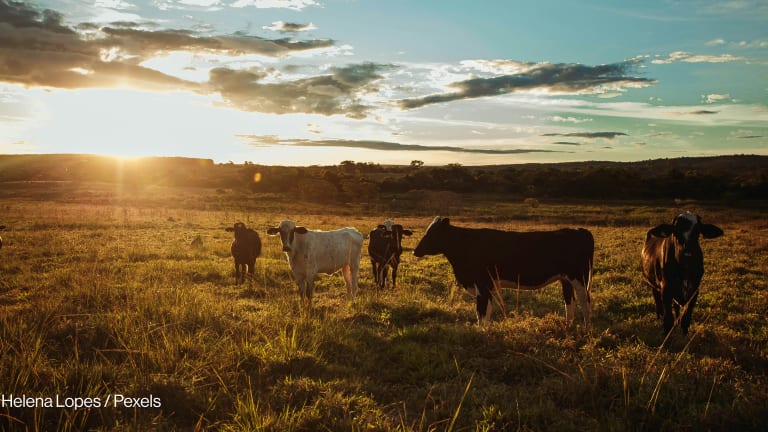
The International Crops Research Institute for the Semi-Arid Tropics, a nonprofit, agricultural research institution, has been awarded this year's Africa Food Prize for their contribution to improving food security in 13 African countries.
Part of our Future of Food Systems series
Find out how we can make food fair and healthy for all. Join the conversation using the hashtag #FoodSystems and visit our The Future of Food Systems page for more coverage.
While accepting the award, Jacqueline Hughes, the institution's director general, said ICRISAT has worked with over 25 million farmers in Africa and Asia through the Tropical Legumes Project — a $67 million project funded by Bill & Melinda Gates Foundation that works with smallholder farmers, governments, and partners to develop improved seed varieties in the legumes family.
According to Hughes, the Tropical Legumes Project aims to contribute to the resilience of dryland systems and smallholder farmers.
Olusegun Obasanjo, the chair of the Africa Food Prize Committee and former president of Nigeria, said the project has resulted in a 32% increase in income for smallholder farmers, while 7% of households involved have been lifted out of poverty and another 14% out of food insecurity.
In 2007, it came to the attention of ICRISAT, along with its partners and donors, that farmers had, for decades, been planting traditional varieties of seeds that could not cope with the challenges of climate change like drought and rising temperatures.
“My emphasis is that it is not a members-only club where we say it is ICRISAT’s efforts, but it is a club where everyone who has the passion and interests of the farmer at heart is invited to participate.”
— Chris Ojiewo, principal scientist and coordinator of the Tropical Legumes Project, ICRISATNational government programs also lacked the capacity to make use of the genetic resources available to develop high-yield varieties for farmers as the low-yielding varieties could not battle pests and diseases and could not attract market demand — leading to an endless cycle of farmers growing them solely for home consumption.
To help them out of this cycle, the ICRISAT-led team enlisted scientists and researchers to develop varieties that were high-yielding, resistant to pests and diseases, as well as drought-tolerant.
"The improved varieties were also expected to meet market demands so that farmers could sell them and transition into agribusiness," Chris Ojiewo, the principal scientist and coordinator of the Tropical Legumes Project at ICRISAT said.

By 2019, ICRISAT — together with the International Center for Tropical Agriculture and International Institute of Tropical Agriculture — had developed 266 improved legume varieties and produced about a million tons of seeds.
These included cowpeas, pigeon peas, chickpeas, common beans, groundnuts and soybeans developed for farmers in 13 African countries — Kenya, Burkina Faso, Ghana, Mali, Niger, Nigeria, Senegal, Ethiopia, Malawi, Mozambique, Tanzania, Uganda and Zimbabwe.
Agricultural subsidy reform is needed to meet SDGs, UN report says
Agricultural subsidies must be reformed to ensure the world can afford to feed the population a healthy, nutritious diet while also meeting the Sustainable Development Goals.
"Most of the work is done in partnership with national government programs because they later own the varieties and release them to farmers," Ojiewo said.
But rolling out the legumes project has had its share of challenges. Prolonged droughts, floods, and pests such as Fall armyworms and desert locusts sometimes undermine gains that ICRISAT has made. And many parts of Sub-Saharan Africa are faced with political insecurity — making them difficult for ICRISAT to access.
The organization has, however, managed to reach these areas by working with NGOs and community-based organizations that interact regularly with smallholder farmers, Ojiewo said. He added that he sees ICRISAT breaking all the silos and boundaries that smallholder farmers face so that they are able to get the best benefits out of the project in the next five years.
“My emphasis is that it is not a members-only club where we say it is ICRISAT’s efforts, but it is a club where everyone who has the passion and interests of the farmer at heart is invited to participate,” Ojiewo said.
Visit the Future of Food Systems series for more coverage on food and nutrition — and importantly, how we can make food fair and healthy for all. You can join the conversation using the hashtag #FoodSystems.









